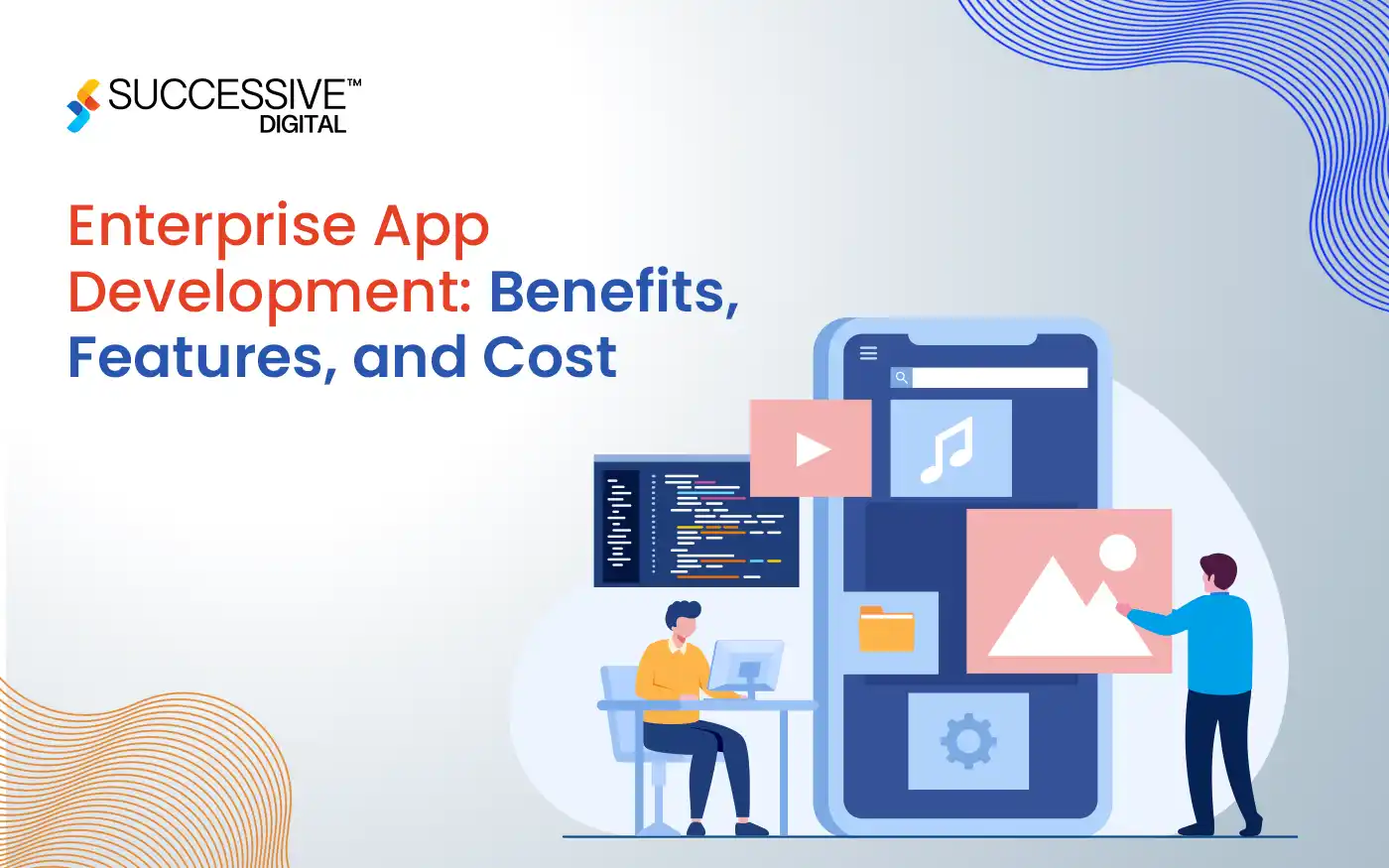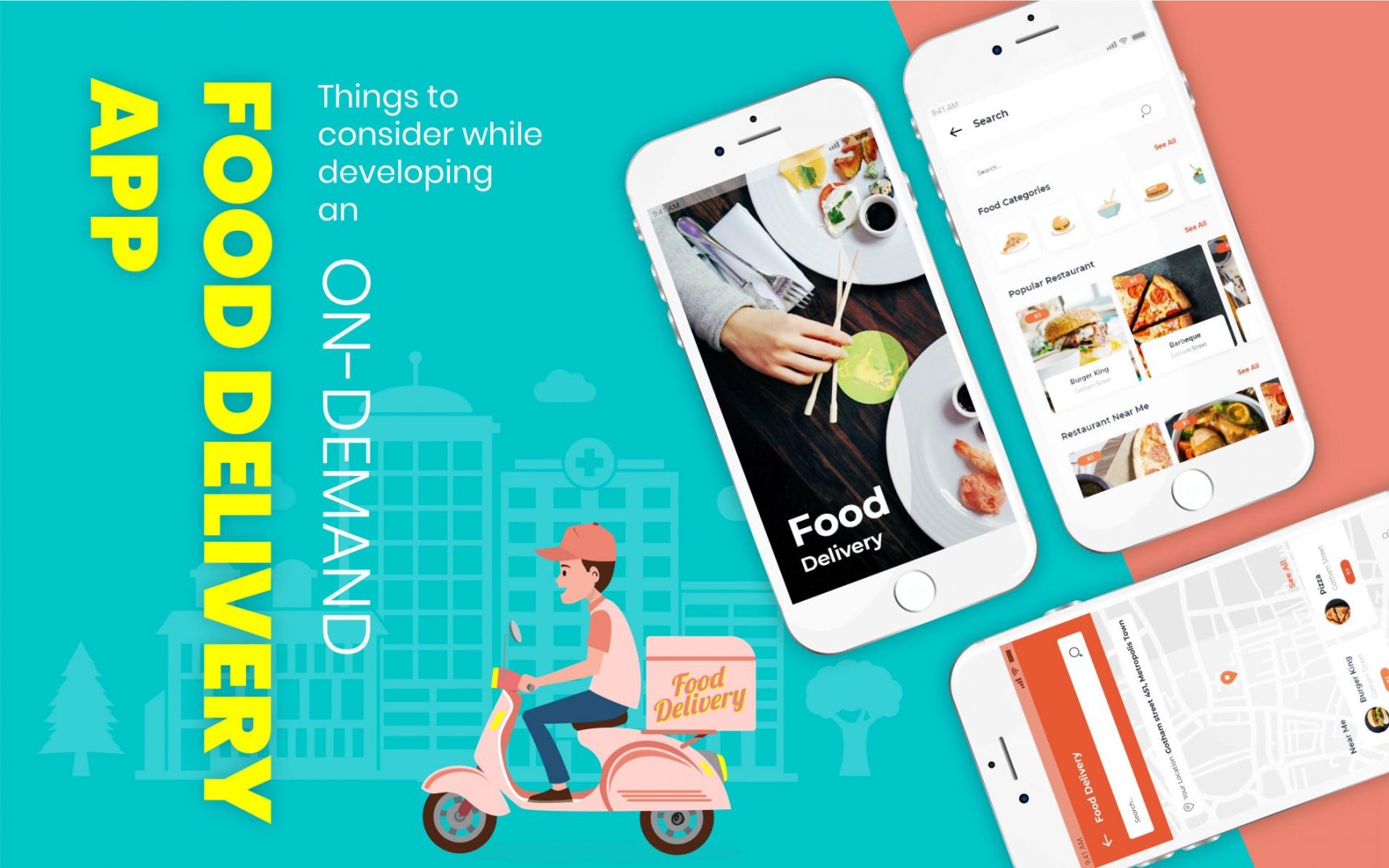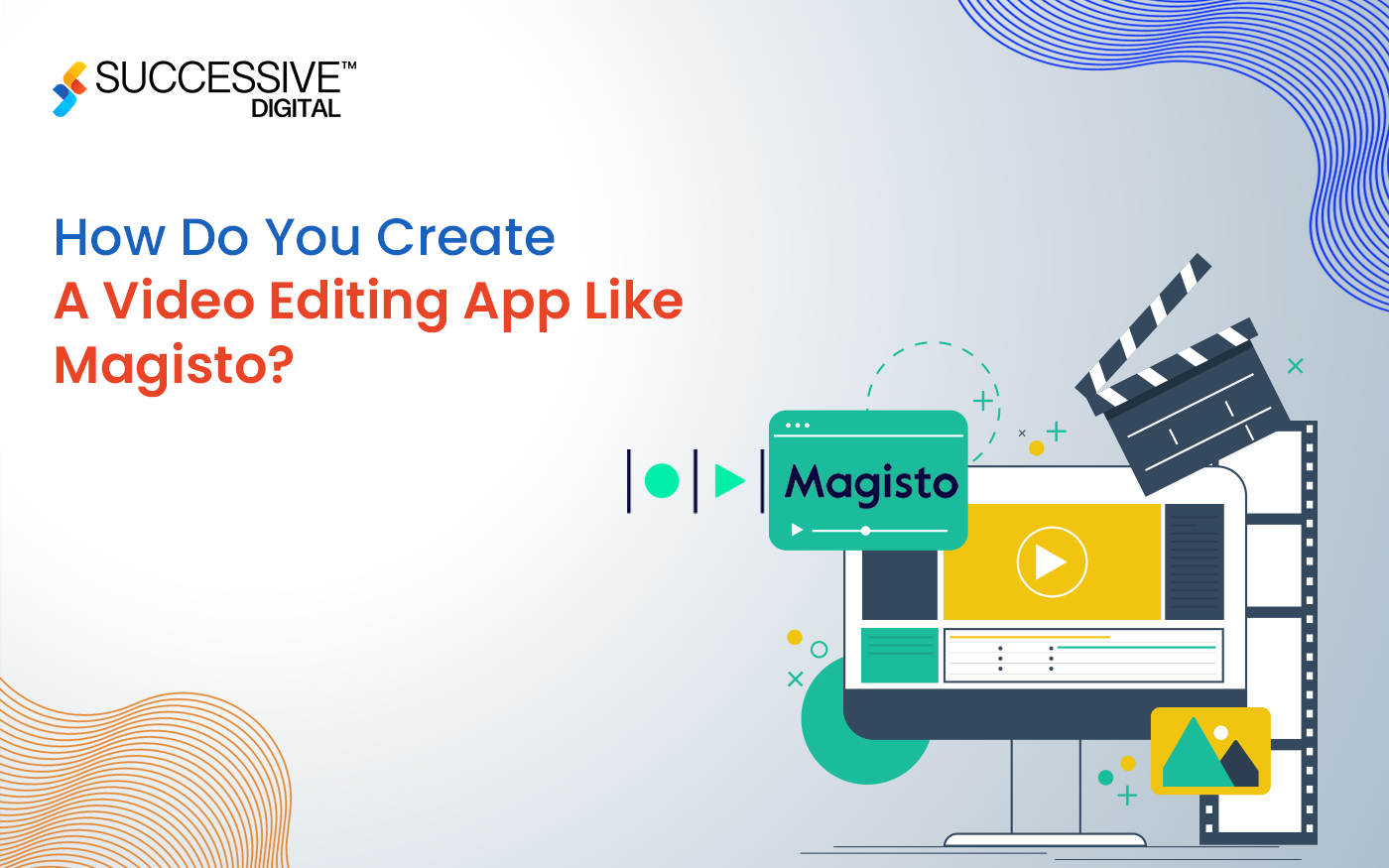Android app development will be one of the considerably profitable industries in the world in the next few years. We say that because, with Android, platform companies can reach millions of users at affordable prices. If you want to use your app to make a good income, then Android app development is your best option. The article will tell you everything you need to know about android application development.
According to StatCounter, the Android operating system has a fascinating 71.43% global market share.
What Is Android App Development?
Android app development is the process of creating apps for Android devices. It involves several technical and creative elements, but it’s also a business process that needs to be ongoing.
It’s a technical process in which an engineer creates a mobile application based on an existing program (or code). The engineer works with graphic designers and marketing departments to develop the user interface (UI) and other features that make your app unique from similar products in the marketplace. You’ll want your engineers or programmers to have experience developing applications before starting on yours; otherwise, they might need to gain previous knowledge about how things work together!
What Are Some Popular Features of Android Os?
Android OS is an operating system that Google developed. It has many features that make it popular with users.
Some of the most popular features of Android OS are:
- The operating system is open source, meaning that it can be modified by anyone who wants to do so.
- The user interface is customizable and can be changed to suit the user’s needs.
- The operating system has a large app store from which users can download apps for free or at a cost per their choice.
- Android OS allows for multitasking, meaning that users can run more than one app simultaneously without closing one before opening another.
The Different Types of Android Apps
There are mainly three types of android apps Native, Hybrid, and Web.
Let’s understand each of them:-
Native App- This is the most common type of Android app, and it’s a full-featured application that runs on the device itself.
Hybrid App-A hybrid application combines native and web development elements to create an experience that works well on both platforms (phones with touch screens, tablets with keyboards).
Web App-Web applications are accessible via the web instead of desktop or mobile. Web Apps run in a browser and have a user interface that can customize with HTML and JavaScript coding.
Web Applications include websites, online forms and surveys, business applications, social media platforms, and many other types of software. Web Apps have become a popular choice for businesses because they allow you to use existing content without developing it from scratch. Web Apps also offer the ability to host your website off-site so that if one server is compromised, there’s still another available in case anything happens.
The Benefits of Developing an Android App
Developing an Android app is a splendid way to get your business. You can use it as a marketing tool or share content with customers.
Here are some of the advantages of developing an Android app. Have a look!
- You can build an audience for your brand that will grow over time. This can be particularly helpful if you’re looking for new customers and want to target them.
- You’ll be able to reach new audiences and find out where they hang out online. This is especially helpful for online shopping or service-based businesses, where customers prefer to shop from their phones rather than in person.
- Android apps provide opportunities for growth by allowing you to connect with new customers regularly through push notifications, email marketing campaigns, social media posts, etcetera! The more people who install your app, the more potential there is for growth within your business.
Also Related: 7 Reasons Why Kotlin Is Your Best Bet for Android App Development
Best Android App Development Tools
The most popular operating system worldwide is Android. As a result, Android apps are well-liked. Most businesses that develop mobile apps do so for iOS and Android devices. You must use the most excellent tools to create a top-notch Android app. Here are some of our top selections for Android development tools:
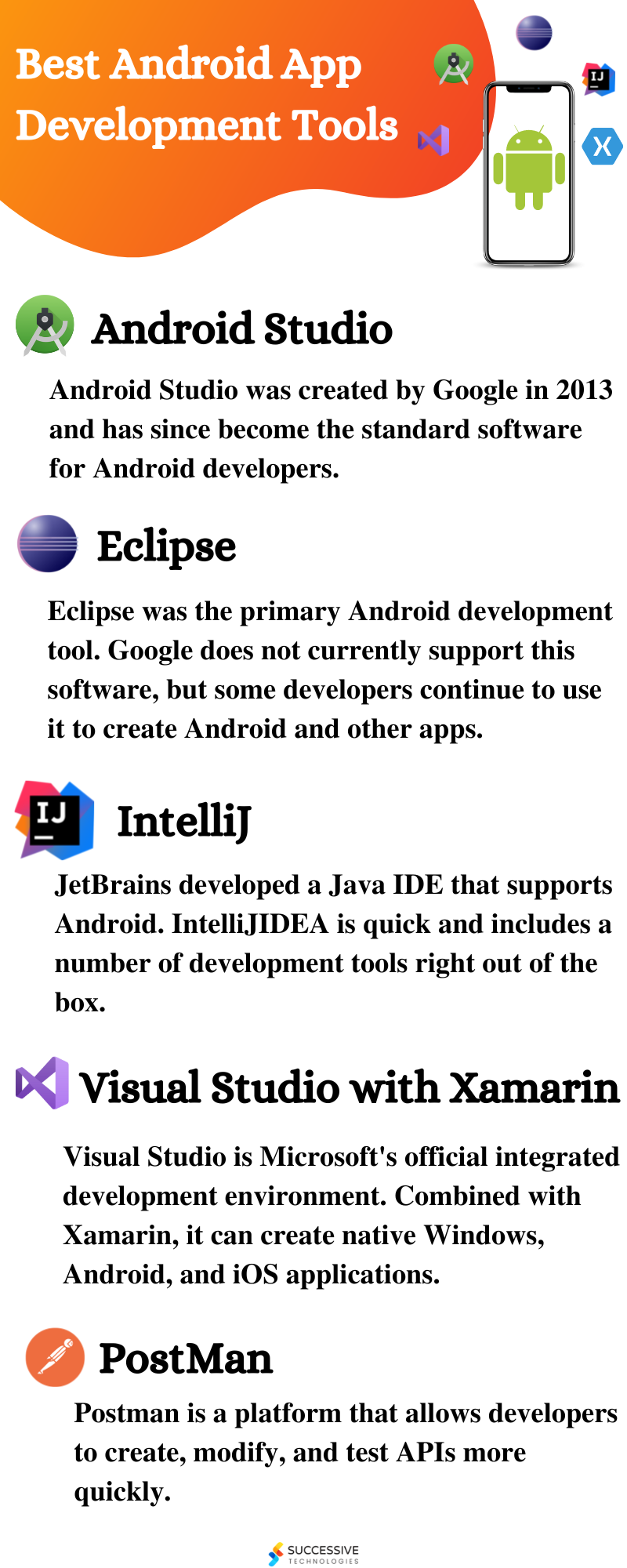
Android Studio
Without Android Studio, it is impossible to discuss the development of Android apps. The simplest tool for Android developers is Android Studio. It was developed by Google in 2013 and has essentially replaced other technologies for Android developers. It’s an excellent tool because it is supported by Google and a sizable development community.
IntelliJ
IntelliJ should be another option for an IDE. While Android Studio is unquestionably the greatest IDE for Android, IntelliJ is a close second and has several interesting features. IntelliJ is the foundation upon which Android Studio is built. Users may create Android apps quickly and effectively in this environment.
From boilerplate code creation to previously established coding standards, IntelliJ IDEA aims to automate everything it can.
IntelliJ’s context-aware code completion and analysis is a very strong feature.
Eclipse
Eclipse is the next item on the list. Eclipse was the primary tool for Android development before the arrival of Android Studio. Although Google no longer supports this program, some developers continue using it to create Android and non-Android apps. In particular, Eclipse is still a reasonably handy tool for developing cross-platform apps and supports several programming languages.
Visual Studio With Xamarin
We have one more well-known, classic utility to round up this list. Microsoft’s first development environment is called Visual Studio. When combined with Xamarin, you can create native Android, iOS, and Windows apps using practically any programming language.
Postman
One more Android development tool out there that is better for creating APIs (application programming interfaces) than Postman. It is a platform that facilitates the speedy creation, modification, and testing of APIs by developers.
In a virtual workspace, it is also a collaborative tool for teams and enterprises to create APIs. It must be working if more than 20 million developers use it worldwide.
How to Develop an Android App
Ideation
Anything, whether web or mobile, begins with ideation. You must know how your app will operate, what features it will offer customers, how it differs from just having a website, and much more.
The following questions will assist you in coming up with an app idea:
- What does your app try to accomplish? Is it primarily about selling, raising awareness, or something else?
- Who is your intended market? Which kind of application will satisfy their needs?
- How will your mobile storefront be designed?
- What platforms do you intend to use? iOS, Android, or a mixing device?
- What will the cost be?
- When do you want to make the app available?
- How will it be promoted?
Strategy
Forming a strategy comes when you have the idea. This is the point at which your concept will become a workable undertaking. Create a strong, long-lasting approach. Here, you will conduct competitive research and compile the document’s data.
A lot of study is required when developing a strategy, particularly for developing mobile applications. Why? You can find hundreds of similar apps in the Play store and App store. As we previously stated, you must be distinctive if you want to be well-liked by users.
As a result, it is necessary to specify the use cases and gather specific functional requirements, either from a competitor’s website or your own.
UI/UX Design
In this stage of creating a mobile app, the user interface (UI) designer creates the app’s look and feel. In contrast, the user experience (UX) designer plans the interaction between design elements. This involves several steps and numerous reviews. Once the blueprint and visual directions are completed, you may evaluate the app’s movement, flow, and feel. It is recommended to create several different versions of the screen by experimenting with the navigation arrangement, buttons, and other visual components. This increases the likelihood that the UX design is unique. Our talented UI and UX designers can turn your concept into a cutting-edge reality and have already demonstrated their excellence by creating many readily available apps.
MVP Development
The development stage will begin once you complete the previous step. Much coding and rewriting are done throughout the mobile app development stage. Backend/Server Technology, API (Application Programming Interface), and Mobile App Front-End are the key components of the mobile app development process.
Always hire the top mobile app developers to expand your business, whether you plan to design an on-demand or standard app.
Testing and Launch
The testing stage comes after you complete all the app development phases. It is likewise a crucial phase in the creation of mobile apps. Why? This will demonstrate how effectively and smoothly the app functions. Mobile app testing consists of, Functionality Testing, Security Testing, Performance Testing, Manual Testing, and Automated Testing.
The launch phase of the mobile app development process is last but not least. Prepare your back-end deployment before publishing your apps for download on various app stores.
How Much Does It Cost to Make an Android App?
The cost of making an Android app depends on several factors, including the complexity of the app, the number of features it includes, and the amount of time and effort required to develop it. Generally speaking, simple apps can be developed for a few thousand dollars, while more complex apps may cost tens of thousands or more. Of course, the cost of an app also depends on the market it is targeting; apps aimed at the consumer market may cost more to develop than those aimed at the enterprise market.
According to well-known platforms like Clutch and Good firms, the typical cost of developing an app ranges from $ 5,000 to $ 500,000, depending on the total product’s functionality and features and its development cycle.
Consider the cost table that includes the type of app, the total time required for creation, and the corresponding cost to better understand the average cost of developing an app.
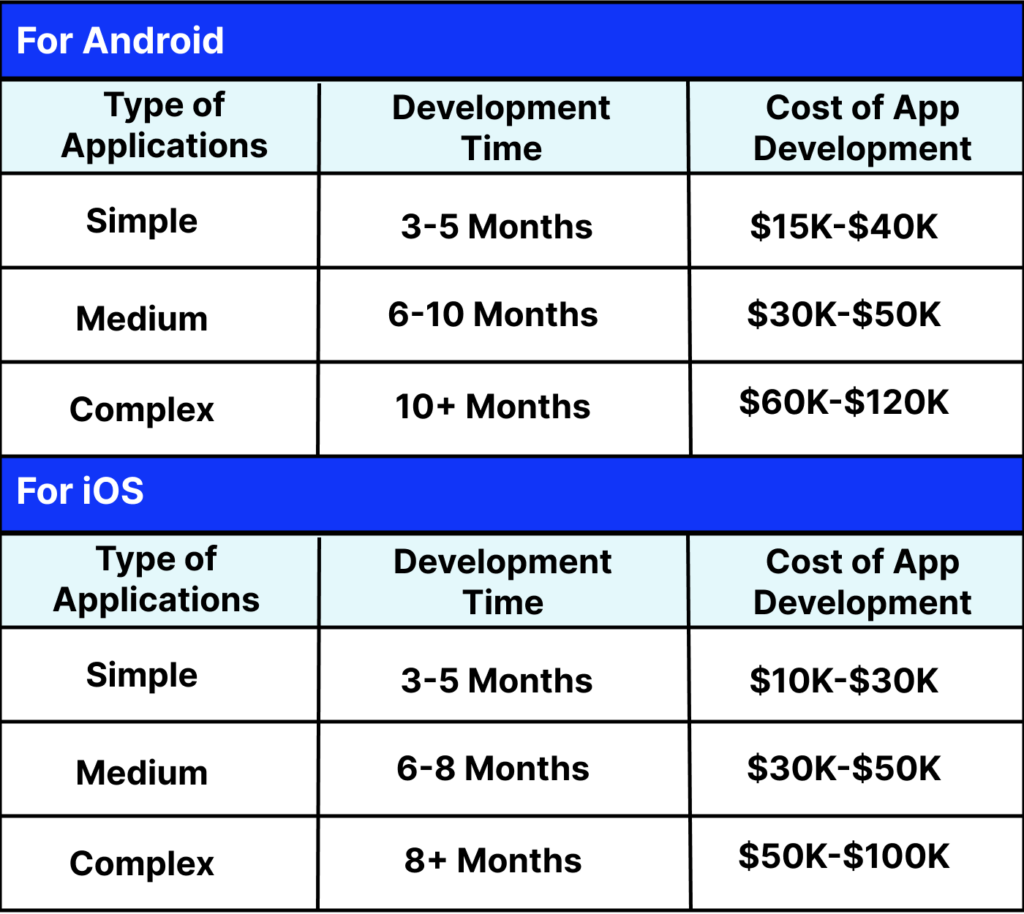
Tips for Successful Android App Development
- Hire a top Android app development company with a solid track record.
- Get feedback from users and improve your app based on their input.
- Use the right tools, such as Butterknife or Dagger, to make your code more modular and easier to maintain over time.* Test your app thoroughly before releasing it into the wild.
- Update regularly to stay ahead of the curve regarding new features/functionality.* Use analytics tools like Google Analytics or Mixpanel to find out what users are doing with your app, how they’re using that functionality, etc., so you can keep improving accordingly!
How Do I Find the Best Android App Development Company?
To find the best Android app development company, look at their track record. A good company will have done projects for clients before and can show you examples of their work. They should also have an extensive portfolio of past clients, so you know what kind of experience they’re offering.
Another thing to consider when looking at a potential developer is their portfolio of clients: how many are there? Are these companies big or small? What’s the average size of these companies? And finally, how many reviews does this particular developer have on sites like Glassdoor or Yelp (or any other review site)?
If possible, try contacting some of these companies directly through email or phone; make sure they answer all questions honestly! If an agency doesn’t reply within 24 hours, then move on—they likely aren’t interested in working with you anyway!
Also Read: Flutter vs. Kotlin: Which Framework Is Right for Your Next Project?
Conclusion
The good news is that Android app development is a growing field. More than 1 billion devices are running the operating system, and demand for apps continues to grow. Google reports that more than 50 percent of all searches made on Android devices are related to apps, which is expected to keep increasing. That means there’s plenty of room for growth in this area! If you want to build your app and market it on Google Play or other online stores, then now may be an ideal time because there are so many opportunities today compared with just five years ago when most people didn’t even know what an “app” was!










